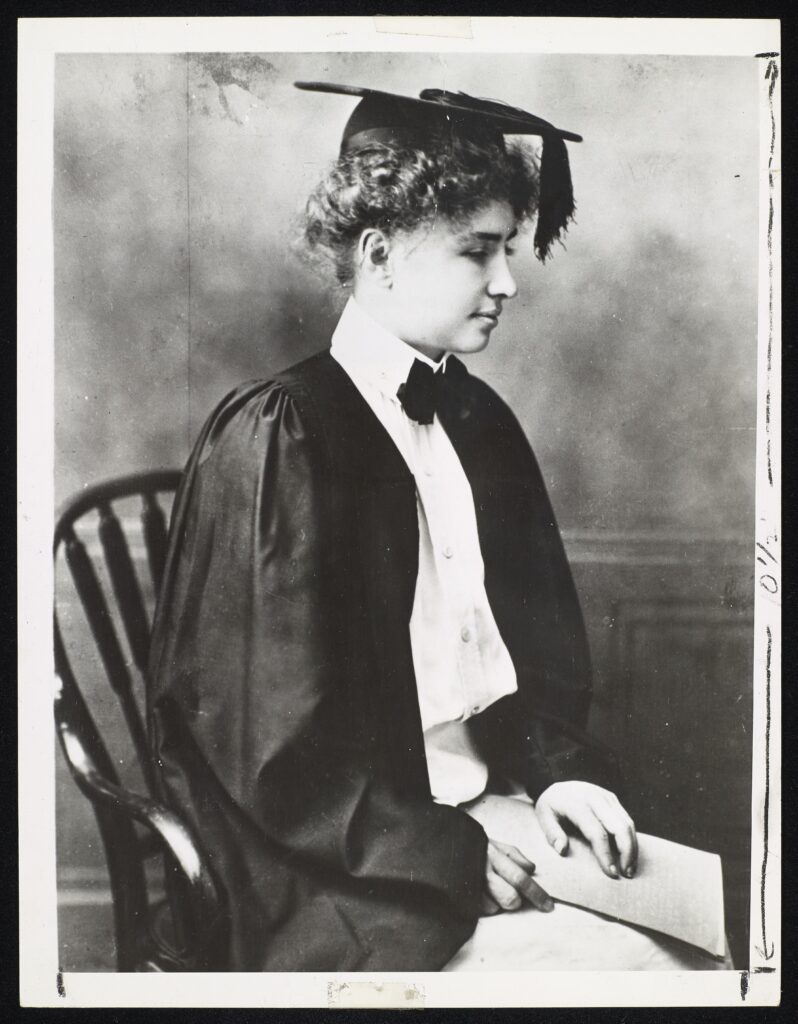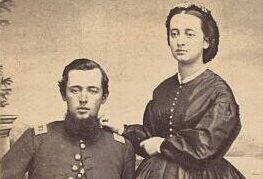By Jessie Todd Johnson
MSNHA graduate student
Alabama does Helen Keller a disservice. We overlook how interesting and witty she was by focusing only on her “Miracle Worker” roots.
I remember first learning![]() about Keller during fourth grade at Valley Intermediate School, and — surprise — we discussed her hometown and teacher. Our school taught us that she learned how to read, write & speak. Then my school taught us nothing else for the next eight years of public education; at most, the English teachers encouraged us to watch the theater department’s production of “The Miracle Worker,” or, over the summer, a classmate would travel to Ivy Green & share what they
about Keller during fourth grade at Valley Intermediate School, and — surprise — we discussed her hometown and teacher. Our school taught us that she learned how to read, write & speak. Then my school taught us nothing else for the next eight years of public education; at most, the English teachers encouraged us to watch the theater department’s production of “The Miracle Worker,” or, over the summer, a classmate would travel to Ivy Green & share what they![]() learned with the class. Although Keller was so much more than her water-pump breakthrough, we weren’t taught about her activism or
learned with the class. Although Keller was so much more than her water-pump breakthrough, we weren’t taught about her activism or![]()
![]()
![]() personal life — and that’s unfortunate because she might be the most interesting Alabamian to reach national acclaim & international acclaim.
personal life — and that’s unfortunate because she might be the most interesting Alabamian to reach national acclaim & international acclaim.
Keller was well-known as a child. Newspapers across the world printed accounts of her educational journey. The first negative press she received was when she was 11 and the Perkins School for the Blind published a story she had written that strongly resembled the previously published story “Frost King.”[1] This event led to speculation on how capable she was of learning, sparking rumors that she was only reciting information others provided her. However, this theory was dispelled when Harvard admitted Keller to Radcliffe College, its female annex, in 1900.[2] Her admittance was a point of pride for the people of the Shoals. The Florence Herald and The Leighton News reported on Keller’s achievements, such as making honors in her classes[3] and being elected vice president of  her class.[4] While a student, Keller wrote her first memoir, “The Story of My Life,” in 1902, which helped to solidify her reputation as a professional writer.[5] After graduating two years later, Keller’s life shifted as she pursued a public role in society.
her class.[4] While a student, Keller wrote her first memoir, “The Story of My Life,” in 1902, which helped to solidify her reputation as a professional writer.[5] After graduating two years later, Keller’s life shifted as she pursued a public role in society.
The skills Keller developed as a writer easily transferred to her work to empower women & advocate for her political beliefs.[6] She supported higher education for women & was intensely vocal about her time at Radcliffe, “A well-trained mind and the ability to grasp ideas essential to a purpose and carry them out with perseverance — this is the ideal Radcliffe places before women,”[7] she wrote. Keller knew how fortunate she was to have gotten an education & felt that college-educated women were the future. Her education was the base she used to catapult her political life & activism. Perhaps her most controversial writing centered on her socialist beliefs. In a speech read before the Women’s Peace Party, Keller said “The future of America rests on the backs of 80,000,000 working men and women and their children. We are facing a grave crisis in our national life. The few who profit from the labor of the masses want to organize the workers into an army which will protect the interests of the capitalists.”[8] She was passionate about her political beliefs, which included pacifism. Keller wrote speeches & letters advocating for peace. She wrote one to Pres. Woodrow Wilson, encouraging him to uphold American democracy without participation in World War I.[9]
Her activism extended after WWI. Keller wrote a letter to the students in Germany reprimanding them for burning her books & those of several other authors.[10] She was adamantly opposed to silencing knowledge & to the atrocities perpetuated against European Jews. In her letter to the students, she wrote “Do not imagine your barbarities to the Jews are unknown here. God sleepeth not, and He will visit his Judgment upon you.”[11] Keller’s strong beliefs led her to stand up for all people. Her activism gained her friendships all over the world. In 1937 she visited Japan for the first time. Takeo Iwahashi, director of the Osaka Lighthouse & also blind, invited her.[12] On the trip, Keller & her companion Polly Thomson spoke to several crowds advocating for aid for the blind.[13] Her activism extended after World War II when she became a goodwill ambassador for the US government. She returned to Japan in 1948 to visit Hiroshima & Nagasaki with the goal of uplifting the Japanese’s spirits.[14] Japan was not the last place Keller traveled to. She traveled to 35 countries as an ambassador for the American Foundation of the Blind and continued to advocate for the blind & deaf until she retired from public life in 1961.[15]
Keller’s life work has left a strong legacy of advocating for marginalized communities such as people who are blind and deaf, women, children & African Americans. That legacy continues to impact many people across the world. She lived a life that had a great influence beyond her humble beginnings in Tuscumbia. I hope Alabama will begin to see how marvelous that life was.
Bibliography:
Darnall, Marcy B. “Passed the Harvard Annex Examination Easily: Helen Keller’s Success.” The
Florence Herald 11, no. 41 (1896): 3.
Pressman, Michael, dir. American Masters: Becoming Helen Keller. 2021; Arlington, VA: PBS.
online.
“Helen Keller’s Books, Essays, and Speeches.” American Foundation for the Blind. American
Foundation for the Blind. February 6, 2023. https://www.afb.org/about-afb/history/helen-keller/books-essays-speeches.
“Helen Keller at Radcliffe.” The Leighton News 12, no. 52 (1900): 2.
“Helen Keller’s Triumph.” The Florence Herald 14, no. 7 (1901): 4.
Keller, Helen. “An Apology for Going to College.” American Foundation for the Blind.
American Foundation for the Blind. February 6, 2023. https://www.afb.org/about-afb/history/helen-keller/books-essays-speeches/education.
Keller, Helen. “Letter to Mr. Wilson from Helen Keller, December 12, 1917.” American
Foundation for the Blind. American Foundation for the Blind. February 6, 2023. https://www.afb.org/about-afb/history/helen-keller/books-essays-speeches/war/letter-mr-wilson-miss-keller-december-12.
Keller, Helen. “Strike Against War,” delivered before the Women’s Peace Party in New York,
New York on January 5, 1916.” American Foundation for the Blind. American Foundation for the Blind. February 6, 2023. https://www.afb.org/about-afb/history/helen-keller/books-essays-speeches/war/strike-against-war-delivered-womens-peace.
Keller, Helen. “Helen Keller’s Response to Nazi Book-Burning: to the Student Body of
Germany, May 9, 1933.” American Foundation for the Blind. American Foundation for the Blind. https://www.afb.org/node/16236.
Selsdon, Helen. “Helen on Helen: Helen Keller’s Travels Through Japan.” AFB Blog. American
Foundation for the Blind. November 11, 2011. https://www.afb.org/blog/entry/helen-helen-helen-kellers-travels-through-japan.
Selsdon, Helen “ Helen on Helen: Helen Keller’s Travels Through Japan, Part 2.” AFB Blog.
American Foundation for the Blind. December 14, 2011. https://www.afb.org/blog/entry/helen-helen-helen-kellers-travels-through-japan-part-2.
[1] American Masters: Becoming Helen Keller, directed by Michael Pressman (2021; Arlington, VA: PBS), online.
[2] Marcy B. Darnall. “Passed the Harvard Annex Examination Easily: Helen Keller’s Success,” The Florence Herald 11, no. 41 (1896): 3.
[3] “Helen Keller’s Triumph,” The Florence Herald 14, no. 7 (1901): 4.
[4] “Helen Keller at Radcliffe,” The Leighton News 12, no. 52 (1900): 2.
[5] American Masters: Becoming Helen Keller.
[6] “Helen Keller’s Books, Essays, and Speeches,” American Foundation for the Blind, American Foundation for the Blind, February 6, 2023, https://www.afb.org/about-afb/history/helen-keller/books-essays-speeches.
[7] Helen Keller, “An Apology for Going to College,” American Foundation for the Blind, American Foundation for the Blind, February 6, 2023, https://www.afb.org/about-afb/history/helen-keller/books-essays-speeches/education.
[8] Helen Keller, “Strike Against War,” delivered before the Women’s Peace Party in New York, New York on January 5, 1916,” American Foundation for the Blind, American Foundation for the Blind, February 6, 2023, https://www.afb.org/about-afb/history/helen-keller/books-essays-speeches/war/strike-against-war-delivered-womens-peace.
[9] Helen Keller, “Letter to Mr. Wilson from Helen Keller, December 12, 1917,” American Foundation for the Blind, American Foundation for the Blind, February 6, 2023, https://www.afb.org/about-afb/history/helen-keller/books-essays-speeches/war/letter-mr-wilson-miss-keller-december-12.
[10] Helen Keller, “Helen Keller’s Response to Nazi Book-Burning: to the Student Body of Germany, May 9, 1933,” American Foundation for the Blind, American Foundation for the Blind, https://www.afb.org/node/16236.
[11] Keller, https://www.afb.org/node/16236.
[12] Helen Selsdon,’ Helen on Helen: Helen Keller’s Travels Through Japan,” AFB Blog, American Foundation for the Blind, November 11, 2011, https://www.afb.org/blog/entry/helen-helen-helen-kellers-travels-through-japan.
[13] Selsdon, https://www.afb.org/blog/entry/helen-helen-helen-kellers-travels-through-japan.
[14] Helen Selsdon, “ Helen on Helen: Helen Keller’s Travels Through Japan, Part 2,” AFB Blog, American Foundation for the Blind, December 14, 2011, https://www.afb.org/blog/entry/helen-helen-helen-kellers-travels-through-japan-part-2.






One Response
Helen Keller’s story is much more than the water pump incident. Despite her fame, Alabama often overlooks her depth and activism, focusing solely on her portrayal in “The Miracle Worker.” In school, we barely scratched the surface of her remarkable life. Keller’s journey from childhood to activism, including her education at Radcliffe College and her advocacy for peace, women’s rights, and marginalized communities, deserves more attention. Her legacy continues to inspire people worldwide, and I hope Alabama will recognize the full extent of her contributions.